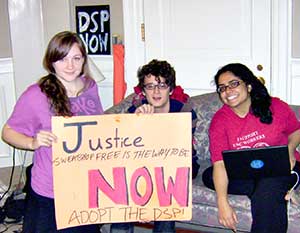Students sit in against sweatshops
By
Linda Gomaa
Raleigh, N.C.
Published Apr 25, 2008 9:38 PM
April 22—Several students and workers from the University of North
Carolina at Chapel Hill are entering the sixth day of a sit-in in Chancellor
James Moeser’s lobby, the longest sit-in at UNC since 1993. About 25
students and workers entered the administration building on April 17 and have
been occupying it ever since.
|
FI ST members Ben Carroll (center) and
Salma Mirza (right) at student sit-in.
WW photo: Peter Gilbet
|
These students and workers are affiliated with Student Action with Workers
(SAW), a UNC group affiliated with United Students against Sweatshops, as well
as several other campus groups that are part of the Sweatfree Coalition and the
community-based youth group FIST—Fight Imperialism, Stand Together.
Brand names such as Nike and Adidas are currently partnered with UNC to make
apparel bearing the “Carolina” name. These brands source the
apparel from factories all over the world and have been paying increasingly
lower prices for the apparel.
It is in the brands’ best interests to pay as little as possible to these
factories for the clothing produced by the workers. This in turn forces factory
owners to cut the wages of the workers producing the apparel.
The workers, however, have not remained silent. Many have tried to organize
their factories or become involved in union activities. These attempts are met
with harsh consequences: union organizers have been assaulted, harassed, fired
and even killed. In addition, brands often “cut and run” from
factories in which a union has been established, sometimes leaving hundreds of
workers without jobs or means of livelihood.
What is important in this situation is the power dynamic. While brands have
power over the factories, administrations of universities have power over the
brands. Recently, students have begun putting pressure on their administrations
to compel brands to pay enough to factories for a living wage, as well as to
allow freedom of association among all workers.
In 1999, students at UNC held a 72-hour sit-in to pressure the university to
adopt codes of conduct which would ensure freedom of association and a living
wage for workers producing Carolina apparel. However, almost 10 years later,
these codes are still not being enforced because brands refuse to pay enough to
the factories to allow for these worker gains. In fact, when factories do
follow these codes of conduct, they are penalized by losing orders to other
factories that pay their workers lower wages.
The Designated Suppliers Program was designed to combat the practice of
“cut and run” by requiring brands to source their apparel from
factories that uphold these basic human rights—a living wage and the
right to organize. The DSP, once adopted by a university, begins a gradual
process of sourcing increasing amounts of apparel from fair labor factories.
These practices would be monitored in the factories by a third-party non-profit
agency called the Worker Rights Consortium. Already, 42 universities have
signed on to the DSP, including Duke, Cornell, Columbia and the entire
University of California system. For three years, students in SAW have carried
out a campaign to ask the UNC chancellor to adopt the DSP and uphold the labor
codes that the university already has in place.
The UNC sit-in is the fourth sit-in in the country in the past two weeks in
support of the DSP, starting with an April 15 sit-in at Pennsylvania State
University where 31 students were arrested. Later that week, nine students were
arrested at the University of Montana, followed by six arrested at Appalachian
State University in Boone, N.C. With the UNC-CH sit-in currently in its sixth
day, students at the University of Florida have begun a hunger strike.
“The university tries to portray itself as a university for the people,
but this struggle around the DSP exposes their true motives—profits and
friendly relationships with big corporations,” stated Ben Carroll, member
of both SAW and FIST. “While the university likes to talk about
respecting workers rights, it does everything it can to ignore the demand for a
DSP for apparel with the UNC logo. This apparel brings in huge profits for the
university because of the cheap labor they are able to secure by
superexploitation of workers. The university won’t sign on to this
program because it would contradict their established capitalist
relationships.”
For more information, visit dsp4unc.wordpress.com/
Gomaa is a member of both SAW at UNC and the Raleigh/Durham/Chapel Hill
chapter of the youth group FIST. She has been an active participant in the sit-ins.
Articles copyright 1995-2012 Workers World.
Verbatim copying and distribution of this entire article is permitted in any medium without royalty provided this notice is preserved.
Workers World, 55 W. 17 St., NY, NY 10011
Email:
[email protected]
Subscribe
[email protected]
Support independent news
DONATE


